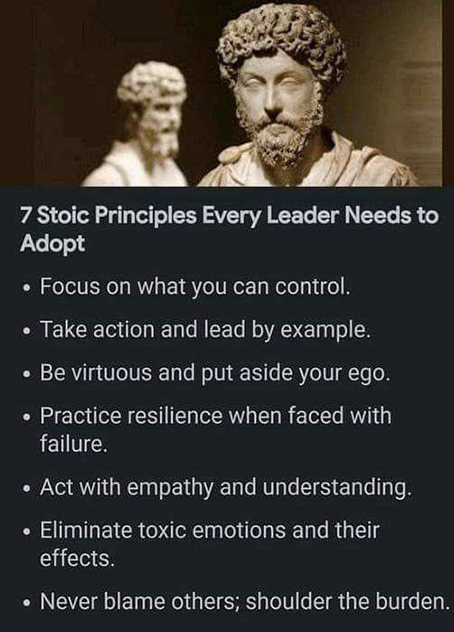Title thumbnail & Hero Image, source: Facebook "page: Stoicism Digest," access date: Feb.16, 2024.
The Daily Stoic: February
First revision: Feb.16, 2024
Last change: Jan.9, 2026
Searched, Gathered, Rearranged, Translated, and Compiled by Apirak Kanchanakongkha.
 Source: Facebook "page: Stoicism Digest," access date: Apr.18, 2024.
Source: Facebook "page: Stoicism Digest," access date: Apr.18, 2024.
 This man is NOT poor, Beggar or homeless, This man is: the giant of world literature "Leo Tolstoy"
This man is NOT poor, Beggar or homeless, This man is: the giant of world literature "Leo Tolstoy"
Tolstoy was a noble Russian who owned a large estate and a great fortune.
Tolstoy gave all his wealth to the poor and homeless.
He lived a life of asceticism.
Among his most famous sayings are:
"Don't tell me about your religion, but let me see religion in your actions."
"If you feel pain. You are alive. But if you feel the pain of others. You are human."
Source: Facebook page "Rumi Is rumi", access date: Nov.3, 2024.
1.
2.
| FEBRUARY |
| PASSIONS AND EMOTIONS |
1.
February 1st
FOR THE HOT-HEADED MAN |
1.
“Keep this thought handy when you feel a fit of rage coming on - it isn't manly to be enraged. Rather, gentleness and civility are more human, and therefore manlier. A real man doesn't give way to anger and discontent, and such a person has strength, courage, and endurance - unlike the angry and complaining. The nearer a man comes to a calm mind, the closer he is to strength.”
-- Marcus Aurelius, MEDITATIONS, 11.18.5b.
1.
Why do athletes talk trash to each other? Why do they deliberately say offensive and nasty things to their competitors when the refs aren't looking? To provoke a reaction. Distracting and angering opponents is an easy way to knock them off their game.
Try to remember that when you find yourself getting mad. Anger is not impressive or tough - it's a mistake. It's weakness. Depending on what you're doing, it might even be a trap that someone laid for you.
Fans and opponents called boxer Joe Louis the "Ring Robot" because he was utterly unemotional - his cold, calm demeanor was far more terrifying than any crazed look or emotional outburst would have been.
Strength is the ability to maintain a hold of oneself. It's being the person who never gets mad, who cannot be rattled, because they are in control of their passions - rather than controlled by their passions.
1.
2.
February 2nd
A PROPER FRAME OF MIND |
1.
“Frame your thoughts like this—you are an old person, you won’t let yourself be enslaved by this any longer, no longer pulled like a puppet by every impulse, and you’ll stop complaining about your present fortune or dreading the future.”
-- Marcus Aurelius, MEDITATIONS, 2.2.
1.
We resent the person who comes in and tries to boss us around. Don’t tell me how to dress, how to think, how to do my job, how to live. This is because we are independent, self-sufficient people.
Or at least that’s what we tell ourselves.
Yet if someone says something we disagree with, something inside us tells us we have to argue with them. If there’s a plate of cookies in front of us, we have to eat them. If someone does something we dislike, we have to get mad about it. When something bad happens, we have to be sad, depressed, or worried. But if something good happens a few minutes later, all of a sudden we’re happy, excited, and want more.
We would never let another person jerk us around the way we let our impulses do. It’s time we start seeing it that way—that we’re not puppets that can be made to dance this way or that way just because we feel like it. We should be the ones in control, not our emotions, because we are independent, self-sufficient people.
1.
2.
February 3rd
THE SOURCE OF YOUR ANXIETY |
1.
“When I see an anxious person, I ask myself, what do they want? For if a person wasn’t wanting something outside of their own control, why would they be stricken by anxiety?”
-- EPICTETUS, DISCOURSES, 2.13.1.
1.
The anxious father, worried about his children. What does he want? A world that is always safe. A frenzied traveler—what does she want? For the weather to hold and for traffic to part so she can make her flight. A nervous investor? That the market will turn around, and an investment will pay off.
All of these scenarios hold the same thing in common. As Epictetus says, it’s wanting something outside our control. Getting worked up, getting. Excited, nervously pacing—these intense, pained, and anxious moments show us at our most futile and servile. Staring at the clock, at the ticker, at the next checkout lane over, at the sky—it’s as if we all belong to a religious cult that believes the gods of fate will only give us what we want if we sacrifice our peace of mind.
Today, when you find yourself getting anxious, ask yourself: Why are my insides twisted into knots? Am I in control here, or is my anxiety? And most important: Is my anxiety doing me any good?
1.
2.
February 4th
ON BEING INVINCIBLE |
1.
“Who then is invincible? The one who cannot be upset by anything outside their reasoned choice.”
-- EPICTETUS, DISCOURSES, 1.18.21.
1.
Have you ever watched a seasoned pro handle the media? No question is too tough, no tone too pointed or insulting. They parry every blow with humor, poise, and patience. Even when stung or provoked, they choose not to flinch or react. They're able to do this not only because of training and experience, but because they understand that reacting emotionally will only make the situation worse. The media is waiting for them to slip up or get upset, so to successfully navigate press events they have internalized the importance of keeping themselves under calm control.
It’s unlikely you'll face a horde of probing reporters bombarding you with insensitive questions today. But it might be helpful - whatever stresses or frustrations or overload that do come your way - to picture that image and use it as your model for dealing with them. Our reasoned choice - our prohairesis01, as the Stoics called it - is a kind of invincibility that we can cultivate. We can shrug off hostile attacks and breeze through pressure or problems. And, like our model, when we finish, we can point back into the crowd and say, "Next!"
---------------
01. Prohairesis (προαίρεσις) is a key ancient Greek philosophical concept, meaning deliberate choice, volition, or moral purpose, representing the rational faculty of choice that defines human beings and is the only thing truly under our control, central to Stoicism for aligning actions with virtue. Rooted in pro- (before) and hairein (to choose), it's the power to choose how we respond to impressions, making it fundamental to ethical living and happiness, as emphasized by Epictetus.
1.
2.
References:
01. THE DAILY STOIC, 366 MEDITATIONS ON WISDOM, PERSEVERANCE, AND THE ART OF LIVING, Ryan Holiday and Stephen Hanselman, 2016, Penguin Random House, 25th Printing, ISBN 9780735211735 (Hardcover), New York, United States.
02. The Beginner's Guide to STOICISM, Tools for Emotional Resilience & Positivity, Matthew J. Van Natta, ALTHEA PRESS, 2019, ISBN: eBook 978-1-64152-722-4.
03. THE PRACTICING STOIC: A Philosophical User's Manual, Ward Farnsworth, ISBN 9781567926118, 8th Printing, 2023, Godine, Boston, Massachusetts, United States.
04. from Facebook, page "Stoicism Digest," access date: Feb.09, 2024.
1.
2.
3.




